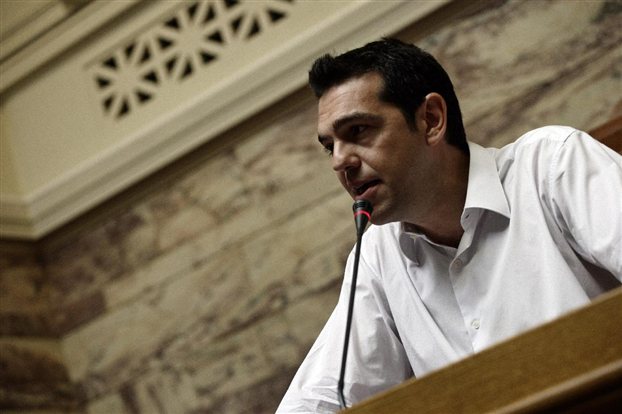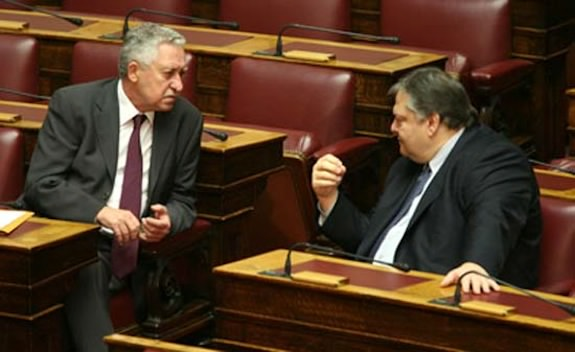Victoria Mindova
Parliamentary opposition leader Alexis Tsipras severely criticizes the absence of a decision from the meeting of finance ministers this week on the payment of the 44 billion euro tranche to Greece. He states that Prime Minister Antonis Samaras is not at the level required for a Prime Minister in such a  critical moment. Tsipras insists that the government has not taken advantage of the key position of Greece in the negotiations with international lenders and he says that instead of setting the conditions on the financial rescue of Greece, the government and Antonis Samaras have agreed with all requirements of international lenders, no matter how damaging they are to the country's financial recovery.
critical moment. Tsipras insists that the government has not taken advantage of the key position of Greece in the negotiations with international lenders and he says that instead of setting the conditions on the financial rescue of Greece, the government and Antonis Samaras have agreed with all requirements of international lenders, no matter how damaging they are to the country's financial recovery.
"Mr. Samaras has become an inseparable part of the election campaign of Angela Merkel, who cannot admit to the German people before the election that she was wrong, that she is responsible for the growing recession and that the foreign debt of Greece should be haircut," states the opposition leader. In his opinion, the last meeting of eurozone finance ministers discussed the idea of a moratorium on the repayment of the foreign debt - a proposal that SYRIZA has long promoted and which Germany has been refusing to comment on publicly.
Tsipras calls the tripartite coalition government "the silent government," which has been wasting precious time in achieving the German goals instead of rescuing the country. "Greece is losing jobs, companies, trust and democracy. The country is sinking, but lenders are gaining time to regroup."
The SYRIZA leader claims that the Greek crisis will not be resolved until the fiscal consolidation measures are implemented. According to him, the cancellation of the Memorandum is a prerequisite for the conduct of any negotiations with the lenders.
In addition, Tsipras calls for new debt restructuring within the context of a pan-European agreement, which will write off the larger part of the Greek sovereign debt. The third condition the radical left sets is a moratorium on the payment of the debt remaining after the haircut until the country reaches a positive economic growth. "The proposal is based on the agreement reached in London in 1953 which relieved Germany and helped it regain its growth after the collapse following the Second World War," explained Tsipras.
The radical left has once again signalled that it is preparing for new elections next year. It has asked for the support of the Greeks, insisting that it is the only alternative for the country in order to be able to stop the vicious circle of recession and layoffs. Representatives of SYRIZA are betting that Europe will not allow Greece to leave the eurozone. They believe that the negative effects of the lack of understanding between Europe and the International Monetary Fund on the issue of the foreign debt will increase and eventually will inevitably lead to further cuts in Greek obligations.
Alexis Tsipras’s statements have caused discontent in the ruling New Democracy. Government spokesman Simos Kedikoglou called the position of the leader of SYRIZA cowardly and narrow-party. "Mr. Tsipras will be disappointed but Greece will cope. He cannot hide his fantasy of the bankruptcy of the country and its exit from Europe," Kedikoglou responded to the attacks.
Eurozone finance ministers have scheduled a new meeting on 26 November this year, at which it is expected a final decision will be taken on the payment of the largest tranche granted to Greece ever.
The irritation in Greece has proved great. Prime Minister Antonis Samaras has urged the Europeans to meet their obligations as the arrangement with the lenders stipulates. "Greece did what it had to do and what it had committed itself to do. Our lenders along with the International Monetary Fund are also obliged to fulfil their commitments," Samaras said after the talks between Europe and the International Monetary Fund reached a stalemate on Tuesday evening.
 The other two parties in the coalition government Evangelos Venizelos (PASOK) and Fotis Kouvelis (Democratic Left) also insist on resolving the differences between the lenders and the immediate granting of the tranche. Venizelos notes that the information about the increase in the Greek debt in 2013 is not new. "The eurozone can no longer use Greece as an excuse for its failure to respond in an effective and definite manner to the various manifestations of the crisis, which is affecting the European Union as a whole and the majority of countries separately," said Venizelos. Kouvelis warns that further delays in the aid to Greece would put at risk both the country and the entire euro area.
The other two parties in the coalition government Evangelos Venizelos (PASOK) and Fotis Kouvelis (Democratic Left) also insist on resolving the differences between the lenders and the immediate granting of the tranche. Venizelos notes that the information about the increase in the Greek debt in 2013 is not new. "The eurozone can no longer use Greece as an excuse for its failure to respond in an effective and definite manner to the various manifestations of the crisis, which is affecting the European Union as a whole and the majority of countries separately," said Venizelos. Kouvelis warns that further delays in the aid to Greece would put at risk both the country and the entire euro area.
Even the ranks of SYRIZA recognize that Greece has fulfilled its part of the bargain and has to receive the aid. Sources from the party comment that the delay of the tranche is currently activating automatic mechanisms of decay in the country - companies continue to withdraw from the Greek market, social and political tensions are being created and society is starting to lose confidence in the system.
Meanwhile, it has become clear that Germany has agreed to reduce the interest rates on the financial aid to Greece. This is expected to facilitate the implementation of the recovery programme by 2016 and the European Financial Stability Facility (EFSF) will provide additional funds as well. However, lower interest rates cannot compensate for the need for additional funding for the extension of the Greek recovery programme by two years.